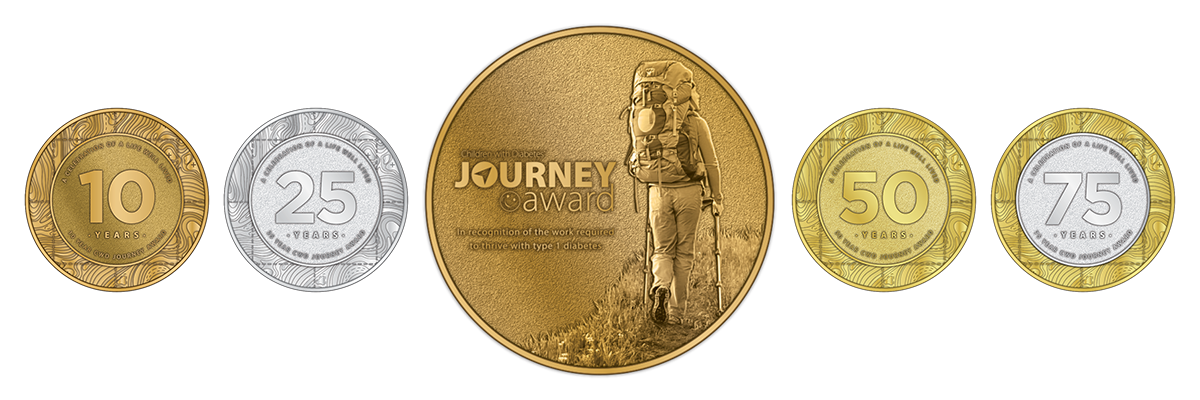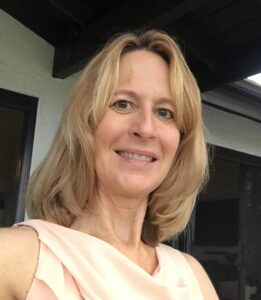

Diagnosed at 51
I became a type 1 diabetic in 2013 at age 51. I feel lucky to have great medical care and I have a wonderful husband who is very supportive. The month I discovered I had T1 was a chaotic experience. I had lost 10 pounds in 2 months; the same 10 lbs I had earnestly been trying to lose for the last 25 years. I was thrilled to be as skinny as a teenager, yet I knew this loss was not OK, it came way too easy. I was also urinating a lot but that had been developing as I aged and seemed a normal part of getting older.
I do not normally hesitate to visit the doctor, but since web pages all said to see your doctor if you loose more than 10 lbs. or more than 10% of your weight I did not go right away. Plus I felt absolutely fine. (Even now I never notice any difference when I have high blood glucose.) Plus I had received a complete blood work-up just 5 months before so I decided that I might be having a thyroid problem and I would see my doctor soon. I then started gorging on carbs, because for the first time in my adult life I could. I had avoided grains and bread most of my adult life so this was such a treat–yum oatmeal!
I finally went to the doctor due to nighttime leg cramps that I now realize was caused by dehydration. The cramps really hurt and the only way to relieve them is to jump out of bed and stand up on the crampy leg. This works like magic and is such a relief. I was about to leave for a camping trip and decided that jumping up from a sleeping bag, in the dark, in a tiny tent, was not going to work very well. I was hoping my doctor would give me some type of muscle relaxer to relieve the cramps. I also mentioned to her my weight loss.
I could not get in for a week so my visit was on a Friday morning, two days before the camping trip. Later in the afternoon I receive a voicemail at work to call my doctor right away. I am panicking because we kept playing phone-tag and by 4:45 we had not connected. I was afraid we would not connect by the end of the workday and then I would spend all weekend worrying. Finally we connect at 5:00 pm and I am told they forgot a certain test and to stop by urgent care for more blood work. Whew! I worried all afternoon for nothing; just another test, no scary results. Fortunately the additional tests were random blood glucose and the A1c.
Friday night my blood sugar results post on my plan’s health portal and I quickly diagnose myself as having Type 2 diabetes based on my random bg of 318. Type 2 is all over my family so getting it this young seemed unusual, but not impossible. Saturday night I receive A1c results of 12.3. I’m not familiar with that test. When I look it up on-line the A1c chart tops at 12.0—oh dear. My husband suggests I cannot be sure I have diabetes so I explain the purpose of those tests IS to diagnose diabetes.
I was meeting out-of-state family for camping and no way was I canceling my trip. Believing that I had type 2 I decided to cut out all sugar and buy a glucose meter to check if my blood sugar improved. The local pharmacy was closed for the night. Since I leave the next day at the crack of dawn I decide to buy a meter during the road trip. 3 hours from home, despite cutting out all sugars and carbs I am still in the 300s. I know this is serious and a call to the Kaiser screening nurse leads me to the nearest urgent care. I constantly text my concerned family in the waiting room while waiting 4! hours to be seen. I felt really awful for causing such chaos during our trip and I keep apologizing to my family for not going to the doctor sooner. They were so supportive! (I would have been very annoyed with my husband if he did this.)
I persuade the doctor that I just need to get by until I get home in four days so I am given metformin. Learning to use insulin while camping seemed too challenging. We set up camp, in the dark and have a very enjoyable trip, but we also worry much of the time. Since I am in my T1 “honeymoon period” I am still producing some insulin and I manage to keep my sugar around 200 by gulping tons of water and eating very little. My doctor finally reaches me on my cell and is happy to learn I already have an appointment for the day I return. When my doctor tells me she is testing for what type of diabetes I assume she means what type of T2; I never dreamed I had T1. After testing positive for GAD antibodies I receive a grocery size bag filled to the top with medical supplies—that full bag was very sobering.
I internet-research everything I can get my hands on and all the bad news is such a downer I literally turn off my computer. When I later discover T1s warriors with positive attestations it means everything to me (thank you all!). I live with T1, I do not suffer from it. I have remained positive from the start. I feel I am very lucky to have this at a time when we have so many great tools to manage this. And I’m glad I did not get this when I was a shy awkward child. As I shared my news with friends I stopped them on the spot if they replied with “Oh, I am sooo sorry. . .” That was not what I needed at that point. That just made me feel worse. My first goal was to simply get to the point where I was not thinking about my diagnose Every-Single-Minute of the day and night.
I am really so thankful to have a serous, yet very treatable disease. I later learned that as a late-onset-T1 I was lucky to get properly diagnosed right away. Everyone comments that I am the perfect person to get this disease. They know that I live a healthy lifestyle and I follow through. I consider this a compliment but I also realize they are not understanding the seriousness of T1.
28 years before my diagnoses I shared a work cubicle with Brad, a T1 who talked about his disease often. I learned a lot about T1 during that time. We kept in touch every few years at work conferences after Brad moved. He is now over 50 years as a T1 with no complications. I feel so lucky to have a friend who understands this part of me and serves as a good role model. It is critical to know others who understand. I can’t get over the irony that we talked about T1 so much and now here I am. At my diagnoses Brad gave me just what I needed–practical advice, without drama. “Never drive while low, avoid white food, never drive low, never drive low”. Brad did not tell me that everything was going to be all right. I now understand how very hollow those words sound when facing something truly serious.
Thank you for letting me share.


Do you have a story to share about your experiences with diabetes? We want to hear from you! Tell us your story using the form below and we'll consider it for inclusion in the CWD Stories section of our website.
